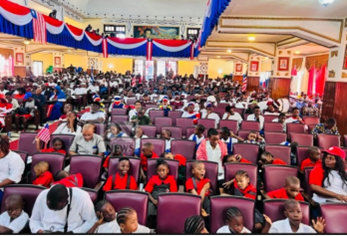Liberia’s 178th National Flag Day celebration, held on August 26, 2025, at the Centennial Memorial Pavilion in Monrovia, was marked by a conspicuous absence of the nation’s highest-ranking officials. Themed “The Flag We Raise, The Values We Uphold,” the event, traditionally a vibrant display of national pride and unity, was subdued by the noticeable lack of participation from President Joseph N. Boakai, Vice President Jeremiah K. Koung, Senate Pro-Tempore Nyonblee Karnga-Lawrence, House Speaker Richard N. Koon, and a majority of the legislature. This unprecedented absence of key government figures cast a long shadow over the proceedings, raising questions and sparking speculation within the nation. Only three cabinet members were present: Minister of Post and Telecommunications Seku Kanneh, Minister of State Mamaka Bility, and Minister of Justice N. Oswald Tweh, who delivered the President’s message in his stead.
Despite the subdued atmosphere created by the absence of key leaders, the ceremony proceeded with the participation of members of the diplomatic corps, high school students, and a small contingent of senior government officials. The event served as a reminder of the enduring symbolism of the Liberian flag, a powerful emblem of the nation’s history and aspirations. The flag, first hoisted on August 24, 1847, consists of eleven stripes – five red and six white – representing the eleven signatories of Liberia’s Declaration of Independence. A single white star rests on a blue field, symbolizing Liberia’s unique status as the first independent republic in Africa. The colors themselves hold deep meaning: red signifies the blood shed in the fight for freedom, white embodies purity and unity, and blue represents the African continent.
Minister Tweh, conveying President Boakai’s message, expressed gratitude to Liberians both within the country and abroad for their resilience in overcoming adversity. The President emphasized the crucial roles of patriotism, unity, and national identity in driving the nation’s progress. He acknowledged the collective strength and shared heritage of the Liberian people, highlighting their ability to endure and overcome challenges together. This message of unity and resilience attempted to bridge the gap created by the absence of leadership at the event, underscoring the importance of shared national identity and purpose.
The President’s message further reflected on Liberia’s historical journey, paying tribute to the sacrifices made by the founding fathers and urging citizens to safeguard the unity they fought so hard to establish. Acknowledging the nation’s ongoing struggles with ethnic divisions, political strife, and health crises, President Boakai expressed optimism for the future, drawing parallels to the nation’s past resilience and ability to overcome challenges. He emphasized that Liberia, despite facing setbacks, is once again striving for progress, a testament to the collective efforts and determination of its people. This historical perspective served to contextualize the present challenges within the larger narrative of Liberian resilience.
The core message delivered by President Boakai centered on the importance of national cohesion and commitment to shared values. He urged Liberians to remain dedicated to peace, democracy, and unity, stressing that these are the foundational pillars for achieving national success. This call for unity and commitment to shared values resonated throughout the President’s message, emphasizing the importance of collective action in overcoming national challenges and achieving progress. The President’s words aimed to inspire a sense of shared purpose and responsibility among Liberians, despite the conspicuous absence of many key leaders at the event itself.
Dr. Jallah Barbu, the Flag Day orator, brought the focus to the urgent need for justice and accountability, particularly for victims of past conflicts and their families. He underscored the importance of addressing past atrocities as an integral part of the path towards lasting peace and reconciliation. Dr. Barbu, who serves as the Executive Director of the Office for the Establishment of the War and Economic Crimes Court, emphasized the court’s role in ensuring justice for all Liberians. He highlighted that the establishment of this court is a Liberian-led initiative, requiring full political will and national support to ensure its successful implementation. This call for justice and accountability resonated as a critical message, particularly in the context of Liberia’s history of conflict and the need for lasting peace and reconciliation. The absence of many key government officials at the event, however, left open questions about the level of commitment to this critical initiative from within the government itself.


